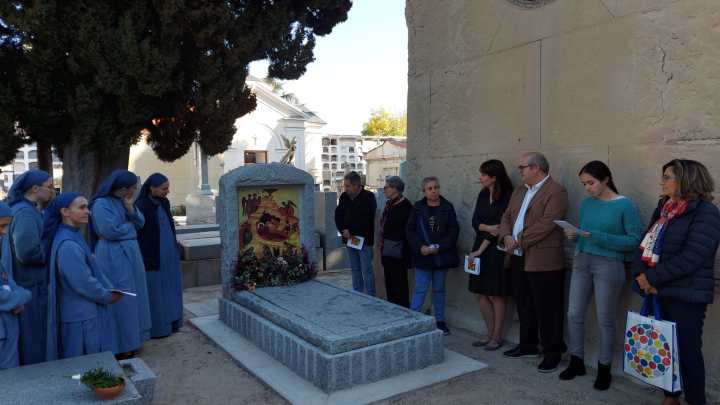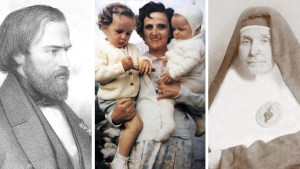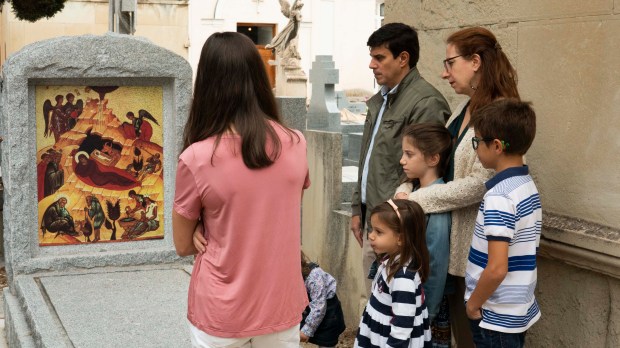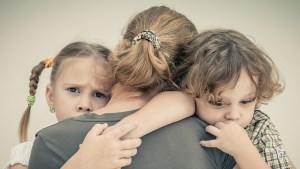Whether a miscarriage occurs at home or in a hospital, the remains of the baby can present a challenge for the family. If the mother passed the remains in a hospital, she might face the added heartache of not being able to have them returned to her, per hospital policy.
A new Catholic funeral home in the city of Madrid, Spain, has the purpose of helping parents who have experienced the death of a child in the womb. Its founder, Helena Acín, explains to Aleteia how they achieve this:
Aleteia: How did you come to start this funeral service for stillborn babies?
Acín: Some parents called us because their daughter had died at 9 weeks of gestation and they wanted to bury her, but they didn’t know how to do it.
For us, it was the first time that someone called us with a daughter who had died during gestation. And we learned from them.
At the beginning, we tried to follow the procedures we follow with an adult, but we ran into obstacles that didn’t help us to ease the hardship these parents were going through.
In Spain, from a health care perspective, their children are considered “human remains.”
And in the civil registry you cannot register a baby that has been stillborn: It’s possible after the 26th week, but only in a book called “Record of aborted babies.” [Ed- In Spanish, the medical term abortion is used broadly, to include “spontaneous abortion,” ie, miscarriage.] Just hearing that word makes you sick to your stomach….
Parents find it difficult to formulate the loss of their child to those around them. Friends cannot support them through the process because sometimes they haven’t even announced the pregnancy yet.
In order to help and accompany parents who want to bury their child, Mary, Gate of Heaven was born.
We’ve adapted everything so that the parents can lovingly accompany their child in this step and deliver it into the hands of the Father.
We go to the hospital, we pick up the child, we wrap him or her with a cloth, and we put the body in a very simple wooden box.
We accompany the parents in consolation and hope and invite them to name their child, and to spend some time with him or her to say goodbye.
We give them a small booklet to hold a prayer service for their child at home if they wish, with a prayer inspired by Christmas.
We make it easier for them to bury their child. For this purpose we’ve bought a specific grave plot for these babies in a cemetery in Madrid. There they can go to remember their children and to pray.

Aleteia: It’s a very specific funeral service, isn’t it?
Acín: The funeral system is prepared for adults and in some cases for children, but not to accommodate this particular situation.
There are no caskets in these sizes, the graves are for adults, the hearses are huge….
It’s as if you were looking for clothes for your month-old baby and you can only find clothes for one-year-old children. Everything’s a bit disproportionate, it doesn’t fit right.
We’ve adapted everything to the reality of such small babies.
Aleteia: This must be difficult for the parents…
Acín: For the parents, losing their child causes great confusion and sorrow. And then there’s the fact that the world around them doesn’t recognize their maternity or their paternity.
The parents feel like, “He’s my son, I want to bury him!” But the answer they receive is, “What for? It’s just human remains.”
And if they want to give their child their name and surname and have it recorded in the civil registry, they find that they don’t have the right to do so.
When a child dies before birth, it’s a difficult moment. What you need is to be embraced and supported, and what you find is hostile territory.
But many parents have started a process to have this situation recognized.
October 15 is the International Day of Pregnancy and Infant Loss Remembrance, promoted mainly by parents who have gone through this. Hundreds of events are organized around the world.
It is a matter of recognizing them just like any other child. Institutional and social recognition is necessary.

Aleteia: Can’t parents bury their baby on their own, in a case like this?
Acín: In Spain, when a child is born in a hospital, a funeral home is needed to pick up the body and bury or cremate it.
Aleteia: Has it been very complicated to start this funeral home?
Acín: It has taken many steps. The funeral home was incorporated in 2019.
I felt called to give this light of hope. And for me it has been like taking a practical master’s degree on how to start and run a funeral home. I’ve walked that path with the help of many people.
Aleteia: Was there anything like it, or is this a new service?
Acín: This service was not designed as a result of a market study. It was born as a response to a need. I received a request from some parents and I decided to help them.
And up to now I haven’t come across anything similar, and I’m not aware that it exists.
If you call a funeral home, they will do the funeral service. But it’s difficult for it to be adapted to the situation of this very small child. And that includes accompanying the parents in welcoming the child and handing him over to God the Father, with simple gestures inspired by the liturgy.
At one point, someone asked me to do the spiritual service alone, just to accompany the parents.
But providing the funeral service gives concrete form to the hope and spirituality you offer.
Aleteia: What spirituality do you experience in those moments together?
Acín: It’s all inspired by Christmas. This is also not something that I came to as an intellectual conclusion; rather, it too came to me from above.
Because when I accompanied the first parents, Juan and Cristina, on July 16, 2020, after burying their daughter, I went to a church where the Little Sisters of the Lamb are, for the celebration of the feast of Our Lady of Mount Carmel.
They didn’t know what I had just experienced. And as part of the liturgy they sang a Christmas song that said:
“In the cracks of the rock I found the love of my soul, a newborn child as if buried in a Virgin tomb, and his face radiated the divine tenderness of the Father.”
This is just what we had just experienced. We had buried the baby in a new tomb that the family owned.
Parents in this situation are called to live the birth of their child to heaven as Mary and Joseph lived the Birth of Jesus: from the first minute they knew that this child was not properly theirs but the Son of the Father, called to a life of intimacy with God.
That is why many Christmas icons depict the Child Jesus wrapped up and lying in a manger that looks like a coffin.
Aleteia: And with the rites and liturgy, do you transmit this spirituality?
Acín: Sometimes there are churches covered with plaster, and when it’s removed during restoration, wonderful paintings are uncovered.
With the liturgy, with the Word, something similar happens: a mystery of what is happening is revealed.
When parents place their child in a tomb or in a columbarium (if cremated), it’s not only an external physical gesture, but it has the meaning of handing them into the hands of the Father.
All parents are called to accompany their children on their journey to God, but for these parents it’s evident because their child has already gone to the Father.
Their Easter is to recognize this step and to accompany this unique vocation of their child with the certainty that they’re already contemplating God’s face.
These parents who lose their child live fully their vocation as parents. To be a parent is to welcome your children without possessing them, and accompanying them in their vocation, which will always surprise you.
Aleteia: How do you help these parents to become aware of this vocation?
Acín: First of all with prayer, because it’s God who acts. And I invoke Mary and St. Joseph in a special way.
We try by our presence, with very simple gestures and words inspired by the liturgy, to accompany the parents and their child.
For those who wish, we propose holding a wake for their child at home and invite them to pray as a family.
To facilitate this, we’ve prepared a small prayer booklet, inspired by the Christmas octave.
As much as possible, we invite them to celebrate a funeral Mass and to experience the burial ritual at the cemetery.
As a Church, we also have to take steps to better welcome these children and their parents.
There’s no specific ritual for children who die in the womb. There’s one for unbaptized children but it doesn’t fully correspond to these different needs.
Aleteia: Is this funeral home only for Catholics?
Acín: No. It’s a Catholic funeral service offered to believers and non-believers alike.
Intellectually you can say, “I’m not a believer,” or reject the Church, but when you witness the beauty and the tenderness this service transmits, that touches your heart and a glimmer of light opens up; something happens.
Aleteia: It makes you live the experience in a different way, doesn’t it?
Acín: The liturgy offers beautiful words. For example: “you are my beloved son.” And it invites contemplation while supporting the parents throughout this experience.
This does not contradict what they experience; it’s not discordant. In the liturgy there’s space to express pain, joy, anger, or anguish; it puts these things into words.
And it’s important that there be time for that, that you be welcomed, that you can cry out to someone, whether it be to God or to the person who is accompanying you. And it’s important that you experience tenderness.
Because if you don’t, all that remains like a cyst inside, because you’re not socially allowed to express it.
“Forget about it, leave the hospital, get on with your life,” they say to those who’re going through the death of a child. But a parent always carries that inside.
And if it’s not fully experienced or talked about, there’s also a risk that the couple’s relationship will be weakened. And the parents experience that when they go through this together, their relationship is strengthened.



